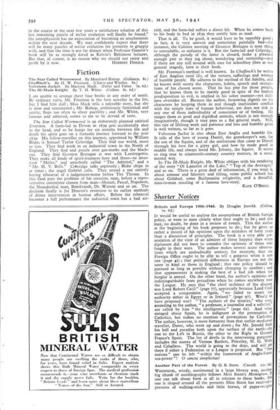Shorter Notices
Britain and Europe 1900-1940. By Douglas Jerrold. (Collins. 7s. 6d.)
IT would be useful to analyse the assumptions of British foreign policy, or even to state clearly what they ought to be ; and this may, no doubt, be done in a review of events. This the author at the beginning of his book proposes to do ; but he gives us rather a record of his opinions upon the mistakes of forty years than a discussion of principles. The book is a very able pre- sentation of the view of an admirer of those happier days when diplomats did not have to consider the opinions of those who fought in their wars. The author makes several acute observa- tions which are undoubtedly correct; for example, that the Foreign Office ought to be able to tell a gangster when it sees one (page 42) ; that political differences in Europe are not the same in kind as those in England ; that one policy should be pursued as long as possible without changing to another ; and that appeasement is making the best of a bad job when the burglar is armed. On the other hand, the author's opinions are indistinguishable from prejudices when he comes anywhere near the League. He says that " the chief architect of the disaster was Lord Robert Cecil " (page 77), apparently because Lord Cecil accepted a compromise. Again, " we failed to assert our authority either in Egypt or in Ireland " (page 97). Would he have proposed war? " The authors of the treaties," who were, according to the author, " a professor, a journalist and a solicitor," are called by him " the intelligentsia " (page 62). And when enraged about Spain, he is indignant at the persecution of Catholics, but makes no mention of persecution by Catholics. The author, however, is more fortunate than that earlier mediaeval traveller, Dante, who went up and down ; for Mr. Jerrold finds his hell and paradise both upon the surface of the earth—the one to the Left in Russia, the other to the Right in General
Franco's Spain. The list of devils in the intervening purgatory includes the names of Vernon Bartlett, Priestley, H. G. Wells and Caballero. The world is going to the dogs, and will ger there if either a Federation or a League is proposed. But " free
nations " can be left " within the framework of Anglo-Saxon sea-power"! 0 sancta simplicitas!






























 Previous page
Previous page